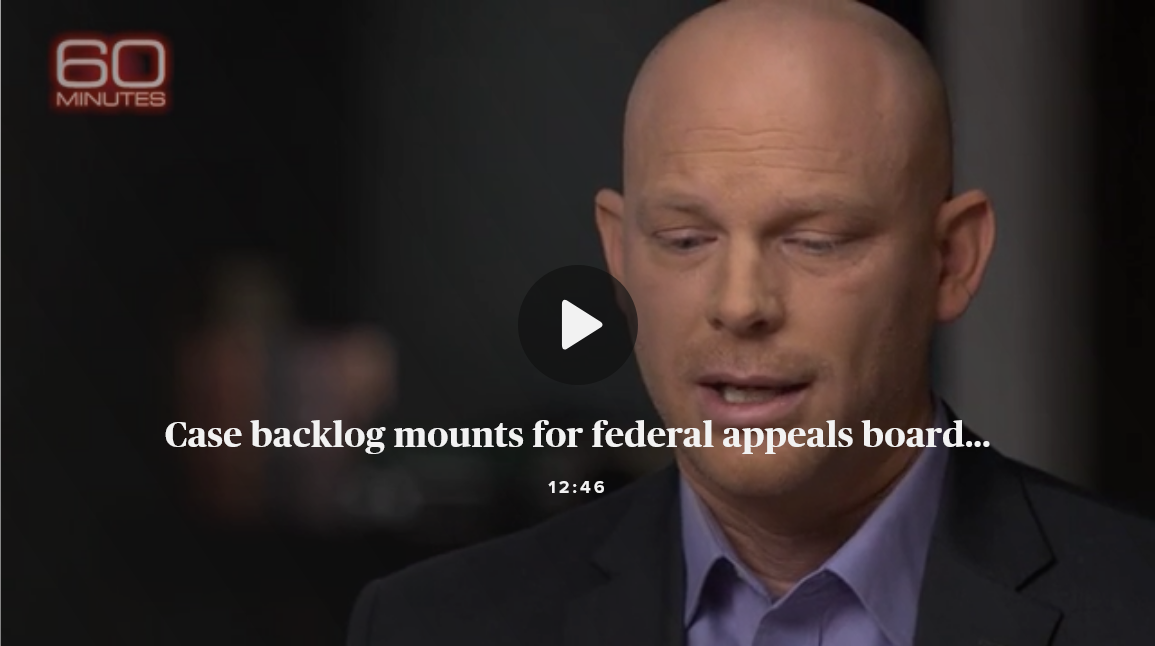60 Minutes Covers Impact of Lack of Quorum at MSPB
This week on 60 Minutes, Norah O’Donnell and the CBS investigative team did a deep dive into the federal agency responsible for providing federal employees with appeal rights should they be disciplined, demoted, or fired: the Merit Systems Protection Board (MSPB). Since 2017, the MSPB has lacked a quorum of board members, preventing it from fully functioning. For over a year, the board has not had any members at all.
“Cases that would usually make their way to the board for a final ruling were instead going into storage, because the chairman's spacious office suite, as well as the vice-chairman's, and another for the third and final member of the board, were all empty, and not because of the pandemic,” O’Donnell explained. “President Trump has nominated people to fill all three open positions, but the nominations have languished in the senate, awaiting confirmation.”
The 60 Minutes segment included an interview with Jim Eisenmann, former general counsel and executive director of the board from 2010 to 2018, to explain the board’s function.
“This agency is there to help and protect federal employees from both bad supervisors and poor performers. And all you need is one bad employee, one bad supervisor for things to go amuck in any federal agency. And if you're getting your benefits, your services, whatever they are, safe drugs and medicine, you're gonna want this agency to be there to protect and-- enforce the Federal Merit Systems,” Eisenmann explained.
“Without a board, without at least two board members, we're lost,” Eisenmann noted.
The segment highlighted the story of federal whistleblower Rick Bright, the first federal official to publicly criticize the Trump administration's response to the coronavirus pandemic.
As 60 Minutes reported, before Bright testified before Congress, he filed a complaint with the special counsel alleging his bosses at Health and Human Services demoted him for being a whistleblower. The special counsel's office "found a substantial likelihood of wrongdoing" and asked HHS Secretary Alex Azar to give him his old job back while it investigated.
The MSPB has the ability to reinstate Bright pending an investigation into his complaint, but without a quorum that process has been stalled. Bright’s case joins a growing list of backlogged cases. A Freedom of Information Act request by 60 Minutes revealed that about a quarter of the cases currently in the MSPB backlog include whistleblower claims.
Attorney Debra Roth was also interviewed in the 60 Minutes segment. She noted that about 15 percent of those who appeal to the board end up getting their jobs back, “And the longer it takes to get their job back, the clock is running because the board will determine that they were fired improperly, illegally, and the remedy will be that they will get a retroactive hiring and their back pay.”
The MSPB is bipartisan by law, requiring that only two of the three board members may be from the same political party. Senate Majority Leader Mitch McConnell told 60 Minutes that the reason for the delay on votes was a question for Senator Schumer.
According to 60 Minutes, a spokesperson from Senator Schumer’s office noted that “…Senate Majority Leader McConnell has full control over which nominees are voted on and which ones aren't."
Note: Debra Roth is an attorney at Shaw Bransford & Roth P.C., the law firm which has published the FEDmanager newsletter since 1998.


